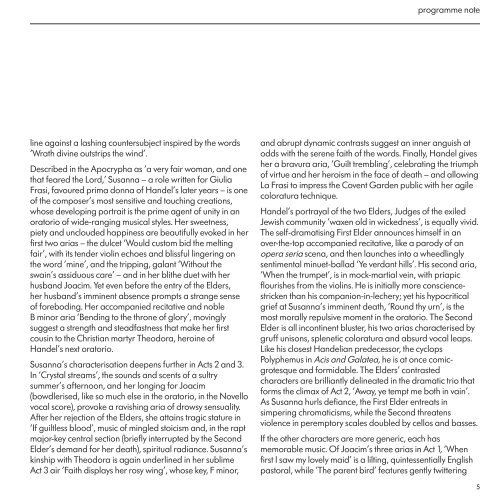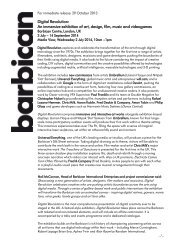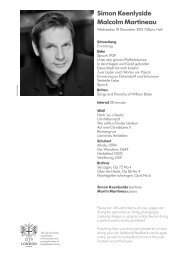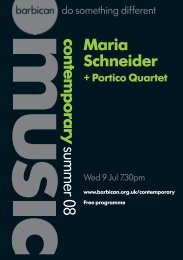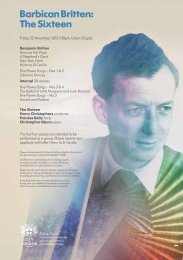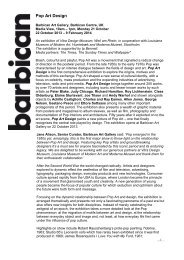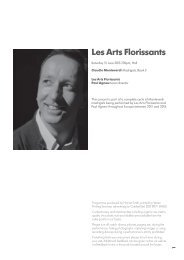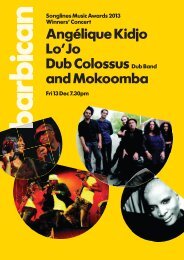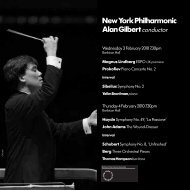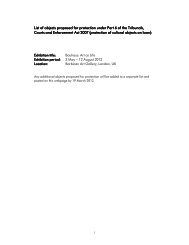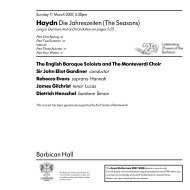Handel Susanna - Barbican
Handel Susanna - Barbican
Handel Susanna - Barbican
You also want an ePaper? Increase the reach of your titles
YUMPU automatically turns print PDFs into web optimized ePapers that Google loves.
line against a lashing countersubject inspired by the words<br />
‘Wrath divine outstrips the wind’.<br />
Described in the Apocrypha as ‘a very fair woman, and one<br />
that feared the Lord,’ <strong>Susanna</strong> – a role written for Giulia<br />
Frasi, favoured prima donna of <strong>Handel</strong>’s later years – is one<br />
of the composer’s most sensitive and touching creations,<br />
whose developing portrait is the prime agent of unity in an<br />
oratorio of wide-ranging musical styles. Her sweetness,<br />
piety and unclouded happiness are beautifully evoked in her<br />
first two arias – the dulcet ‘Would custom bid the melting<br />
fair’, with its tender violin echoes and blissful lingering on<br />
the word ‘mine’, and the tripping, galant ‘Without the<br />
swain’s assiduous care’ – and in her blithe duet with her<br />
husband Joacim. Yet even before the entry of the Elders,<br />
her husband’s imminent absence prompts a strange sense<br />
of foreboding. Her accompanied recitative and noble<br />
B minor aria ‘Bending to the throne of glory’, movingly<br />
suggest a strength and steadfastness that make her first<br />
cousin to the Christian martyr Theodora, heroine of<br />
<strong>Handel</strong>’s next oratorio.<br />
<strong>Susanna</strong>’s characterisation deepens further in Acts 2 and 3.<br />
In ‘Crystal streams’, the sounds and scents of a sultry<br />
summer’s afternoon, and her longing for Joacim<br />
(bowdlerised, like so much else in the oratorio, in the Novello<br />
vocal score), provoke a ravishing aria of drowsy sensuality.<br />
After her rejection of the Elders, she attains tragic stature in<br />
‘If guiltless blood’, music of mingled stoicism and, in the rapt<br />
major-key central section (briefly interrupted by the Second<br />
Elder’s demand for her death), spiritual radiance. <strong>Susanna</strong>’s<br />
kinship with Theodora is again underlined in her sublime<br />
Act 3 air ‘Faith displays her rosy wing’, whose key, F minor,<br />
programme note<br />
and abrupt dynamic contrasts suggest an inner anguish at<br />
odds with the serene faith of the words. Finally, <strong>Handel</strong> gives<br />
her a bravura aria, ‘Guilt trembling’, celebrating the triumph<br />
of virtue and her heroism in the face of death – and allowing<br />
La Frasi to impress the Covent Garden public with her agile<br />
coloratura technique.<br />
<strong>Handel</strong>’s portrayal of the two Elders, Judges of the exiled<br />
Jewish community ‘waxen old in wickedness’, is equally vivid.<br />
The self-dramatising First Elder announces himself in an<br />
over-the-top accompanied recitative, like a parody of an<br />
opera seria scena, and then launches into a wheedlingly<br />
sentimental minuet-ballad ‘Ye verdant hills’. His second aria,<br />
‘When the trumpet’, is in mock-martial vein, with priapic<br />
flourishes from the violins. He is initially more consciencestricken<br />
than his companion-in-lechery; yet his hypocritical<br />
grief at <strong>Susanna</strong>’s imminent death, ‘Round thy urn’, is the<br />
most morally repulsive moment in the oratorio. The Second<br />
Elder is all incontinent bluster, his two arias characterised by<br />
gruff unisons, splenetic coloratura and absurd vocal leaps.<br />
Like his closest <strong>Handel</strong>ian predecessor, the cyclops<br />
Polyphemus in Acis and Galatea, he is at once comicgrotesque<br />
and formidable. The Elders’ contrasted<br />
characters are brilliantly delineated in the dramatic trio that<br />
forms the climax of Act 2, ‘Away, ye tempt me both in vain’.<br />
As <strong>Susanna</strong> hurls defiance, the First Elder entreats in<br />
simpering chromaticisms, while the Second threatens<br />
violence in peremptory scales doubled by cellos and basses.<br />
If the other characters are more generic, each has<br />
memorable music. Of Joacim’s three arias in Act 1, ‘When<br />
first I saw my lovely maid’ is a lilting, quintessentially English<br />
pastoral, while ‘The parent bird’ features gently twittering<br />
5


